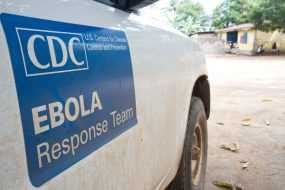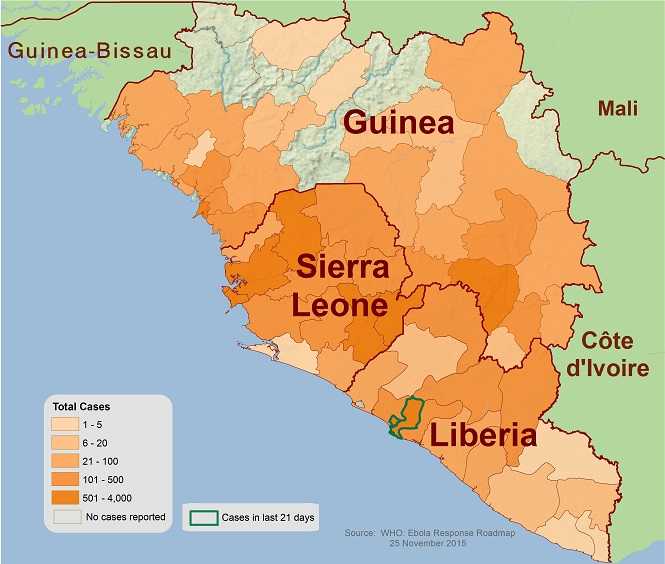The U.S. Centers for Disease Control and Prevention (CDC) began working in Sierra Leone researching Lassa fever in the 1970’s. In 2008, the agency expanded its reach with the U.S. President’s Emergency Plan for AIDS Relief building laboratory and surveillance capacity. During the 2014-2015 Ebola response more than 700 staff served on over 1000 deployments. It was CDC’s largest outbreak response ever in a single country. In 2015, a permanent CDC Country Office was established to focus on Global Health Security efforts.

CDC STAFF
8 U.S. Assignees
15 Locally Employed

AT A GLANCE
Population: 7,092,113
Per capita income: $620
Life expectancy at birth: W 50/M 49 yrs
Infant mortality rate: 1360/100,000 live births
TOP 10 CAUSES OF DEATH
- Diarrheal Diseases
- NTDs & malaria
- Cardiovascular diseases
- Neonatal disorders
- Diabetes/urological/blood/endocrine disorders
- HIV/AIDS & TB
- Neoplasms
- Unintentional injuries
- Cirrhosis
- Nutritional deficiencies
Sources: Population and Housing Census 2015, World Bank 2015, World Health Statistics Report 2016, Trends in Maternal Mortality 1990 to 2015, and Levels and trends in child mortality 2015.
Source: WHO 2012
Impact in Sierra Leone
Global Health Security Agenda
CDC is working with Sierra Leone to improve their ability to prevent, detect and respond to infectious disease threats. This work helps meet the U.S. commitment to assist at least 31 countries in reaching the targets outlined in the Global Health Security Agenda. CDC’s extensive global health presence and experience are critical to achieving these targets.
In the News
Impact in Sierra Leone
- Support of the global polio eradication contributed to zero cases since 2010
- Tested 1/3 of all samples during Ebola response
- More than 90% of health facilities now provide timely reports to the district, up from 35% in 2015, through the Integrated Disease Surveillance and Response System
- Graduated Frontline Field Epidemiology Training Program health workers covering all 14 districts
- Aided in response to national measles outbreak and launch of vaccine campaign reaching 2.8 million children
- Helped conduct first Joint External Evaluation to gauge health security progress
CDC Sierra Leone Country Office
The U.S. CDC provides public health management, technical, and research support and leadership to the Government of Sierra Leone (GoSL) to implement the Global Health Security Agenda (GHSA). Through the Ministry of Health and Sanitation (MoHS), CDC supports all GHSA action packages with a focus on epidemiology and surveillance, workforce development, laboratory systems strengthening, emergency management, immunization, and antimicrobial resistance.
Ebola
Sierra Leone suffered the highest number of confirmed or suspected cases of Ebola in West Africa with more than 14,000 cases and 3,900 deaths. Together the U.S. CDC and the CDC Foundation contributed more than $120 million to Ebola response, recovery, and research activities, including establishing the nation’s first national public health Emergency Operations Center. CDC supported the GoSL in ending the outbreak through technical and strategic support in epidemiology, infection prevention and control, case management, health promotion, laboratory diagnostics and systems strengthening, emergency management, border health, and research.
Epidemiology and Surveillance
U.S. CDC technical assistance strengthens MoHS disease surveillance and epidemiological capacity with a focus on communicable disease, mortality, ecological surveillance, and reporting.
Workforce Development
U.S. CDC and the MoHS launched the Frontline Field Epidemiology Training Program in 2016. Plans are underway to introduce intermediate and advanced programs. CDC is also expanding workforce capacity through program management and leadership training and partnering to establish a national public health agency.
Laboratory Systems Strengthening
U.S. CDC and partners helped establish the nation’s first Central Public Health Reference Laboratory in 2011. Laboratory systems strengthening continues with the launch of a 5-year national laboratory strategy and standard operating procedures, workforce development and capacity building through training and mentorship, equipment, renovations, and introducing new laboratory tests.
Emergency Management
U.S. CDC provides technical assistance to MoHS national and district Emergency Operations Centers. CDC and partners enhance the receiving, analyzing, processing, and sharing of public health information enabling the real-time review of public health data and rapid response to public health emergencies.
Immunization
U.S. CDC supports MoHS immunization activities including creating a 5-year immunization plan, a systems strengthening workplan, and conducting an availability and readiness assessment to inform strategies. In 2016, CDC helped conduct a nationwide measles vaccine campaign and supported national oral polio vaccine campaigns and an acute flaccid paralysis review to help keep the country polio-free. CDC also introduced a biometrics-based immunization tracking system in Freetown to increase vaccine coverage data.
Antimicrobial Resistance
U.S. CDC works with the MoHS to combat antimicrobial resistance by improving healthcare systems. Priorities include quality improvement and quality assurance, infection prevention and control, healthcare- associated infection surveillance, and utilizing the U.S. President’s Emergency Plan for AIDS Relief funding.
- Page last reviewed: August 16, 2017
- Page last updated: August 16, 2017
- Content source:
Global Health
Notice: Linking to a non-federal site does not constitute an endorsement by HHS, CDC or any of its employees of the sponsors or the information and products presented on the site.



 ShareCompartir
ShareCompartir


